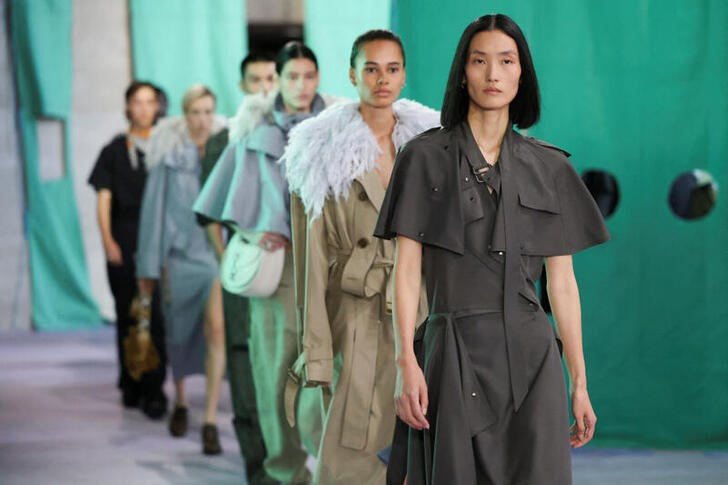Luxury stocks have been experiencing a downturn in popularity among investors in recent years, primarily due to economic challenges such as rising consumer costs and an economic slowdown in China. However, according to a recent note from Deutsche Bank, the outlook for the luxury sector may be poised for improvement in the coming year. The bank’s analysts expressed optimism, suggesting that after two consecutive years of underperformance compared to retail and sporting goods, a turnaround could be imminent. They emphasized that the timing of this shift is crucial, signaling that changes in earnings momentum and investor sentiment may help restore confidence and performance in the luxury market. As uncertainty lingers, the analysts noted a heightened focus on “volatility” in the coming months.
Deutsche Bank views the current struggles in the luxury sector in China as cyclical rather than structural. They anticipate that trends such as “luxury shaming” may dissipate within the next couple of years, paving the way for a resurgence in consumer confidence and willingness to display wealth overtly. Additionally, potential U.S. tariff hikes are assessed to be less impactful for luxury brands compared to other sectors. As President-elect Donald Trump contemplates tariffs against countries like China, the analysts at Deutsche Bank remained optimistic about the luxury sector’s resilience. They pointed out that the Year of the Snake in 2025, associated with renewal, could symbolize both challenges and opportunities for luxury brands.
Among Deutsche Bank’s preferred picks in the luxury space is the French group Kering, home to iconic brands like Gucci and Yves Saint Laurent. The analysts acknowledged Kering’s poor financial performance in 2024, highlighting a significant drop in share price and sales. Despite the recent challenges, they noted a consistent high regard for the Gucci brand among consumers, suggesting potential for recovery. They characterized Kering’s management outlook as cautiously optimistic, with explicit guidance provided for earnings before interest and taxes (EBIT) in 2024, leading to a “buy” rating from the bank and a target price of €320. The analysts believe that as market conditions improve, Kering could significantly benefit from the resurgence in luxury demand.
Another luxury brand receiving attention from Deutsche Bank is Burberry, which faced a challenging year marked by diminished revenue and the removal from the FTSE 100 index. Recently appointed CEO Joshua Shulman is steering the company towards a turnaround plan, emphasizing urgency in addressing past underperformance. Burberry reported a 22% fall in revenue over the first half of its fiscal year but has implemented strategic initiatives to improve this trajectory, including cost-saving measures and product line enhancements. With positive sentiment around its new strategies, Deutsche Bank upgraded its rating on Burberry to “buy,” forecasting potential alignment with luxury consumer preferences over the next 12 to 24 months.
Extending beyond the luxury sphere, Deutsche Bank also recommended several retail stocks, including the British high street retailer Marks & Spencer (M&S). The bank conferred a “buy” rating on M&S, citing a robust performance in 2024, supported by a transformation in its business model. The analysts noted that M&S is well-positioned to capture market share amidst inflationary pressures and that its clothing and home division has seen solid sales growth. Furthermore, as M&S has engaged in collaborations with esteemed personalities, the brand’s relevance and appeal have significantly improved, aligning it with contemporary consumer preferences.
In the broader retail context, the German online fashion retailer Zalando was identified as a key growth player. The analysts at Deutsche Bank noted Zalando’s market leadership in Europe as online sales growth begins to recover, setting a target price of €36 per share. With the company’s satisfactory market conditions and guidance for modest revenue growth, Zalando’s focus on expanding into adjacent categories—spanning beauty, sports goods, and premium brands—presents an exciting investment opportunity. As such, Zalando has enjoyed a share price increase of 40% year-to-date, although it remains below its 2021 peak.
Additionally, the sporting apparel sector is represented in Deutsche Bank’s recommendations by Puma, which the analysts believe has a favorable outlook over competitors like Adidas. Citing an upswing in sales and improving brand perception due to product relaunches, the analysts set a €60 target price on Puma shares. They recognize potential challenges posed by U.S. tariff implications and currency strength on profit margins. However, with a growing fan base and a reasonable valuation following recent performance upticks, Puma embodies an attractive investment aligned with the broader theme of renewal and recovery anticipated across the luxury and retail sectors in the upcoming year.

